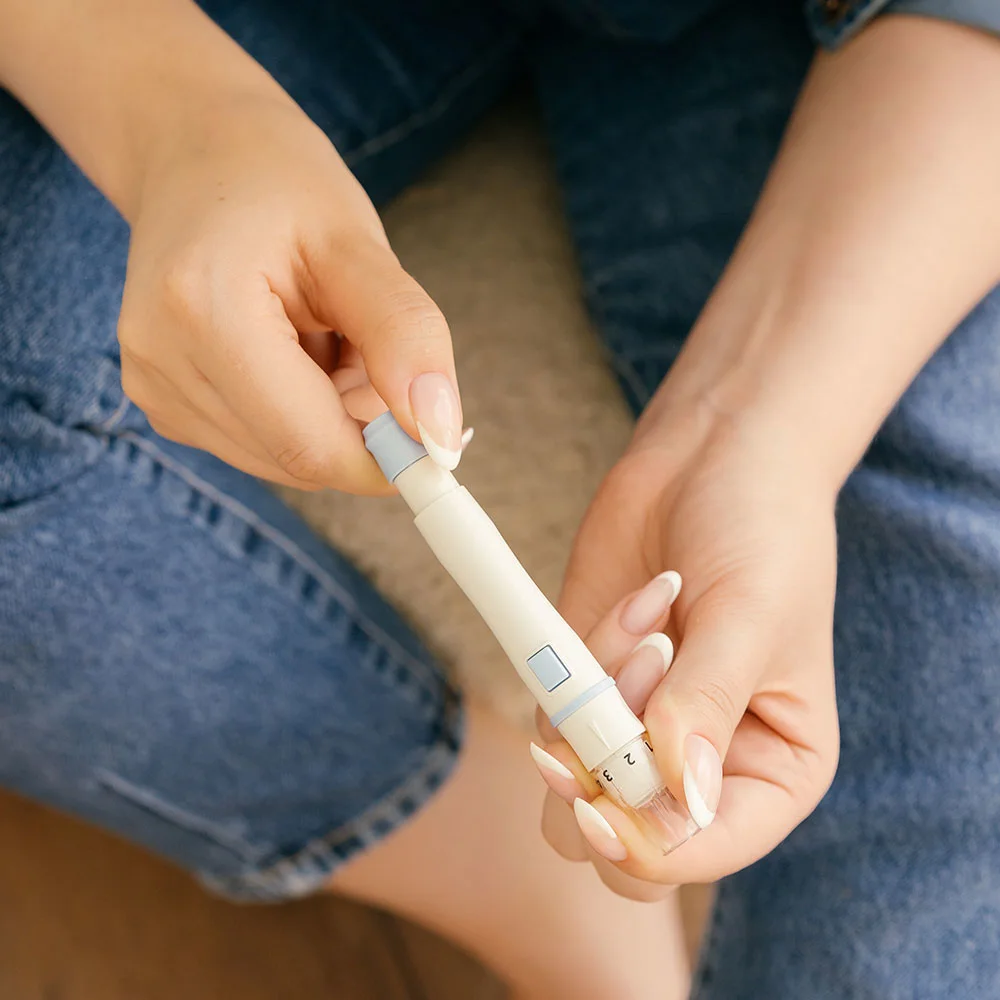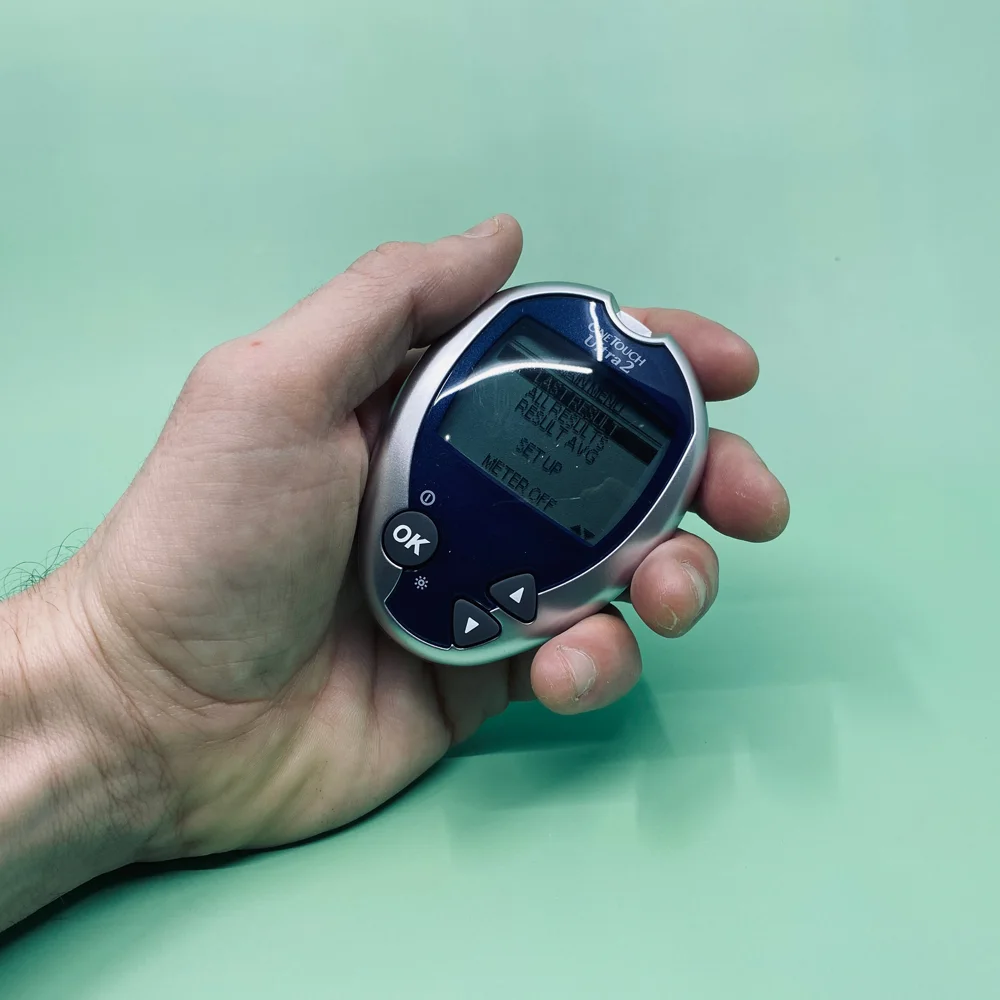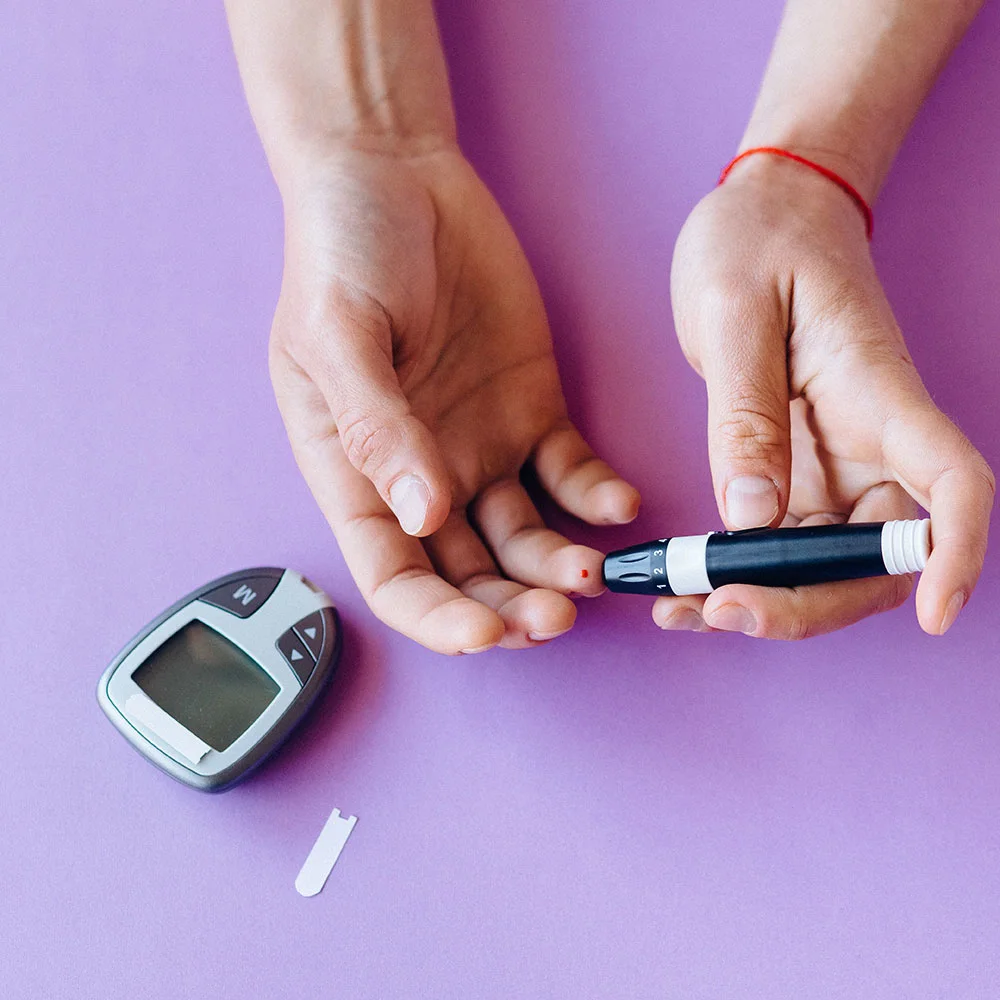Here's what we'll cover
Here's what we'll cover
Here's what we'll cover
Of the many blood tests ordered by healthcare practitioners, Hemoglobin A1C test (HbA1C), called A1C for short, is among the most common. If you’re over 45 or have one of many risk factors for diabetes mellitus (aka diabetes), you’ve probably had your A1C measured. So, what is HbA1C, why do we care about it, and why do healthcare providers measure it so often? In this article, we’ll take a deep dive into HbA1C testing, including its pros and cons.
What is HbA1C?
As you may recall from high school, hemoglobin is a particular protein in red blood cells (RBCs) that transports the vast majority of oxygen in our blood. When RBCs are exposed to glucose (sugar), some glucose molecules attach to hemoglobin in a process called glycation. This is why A1C is sometimes called glycated hemoglobin.
RBCs typically live for about 120 days. Glycation is a normal process, and it happens on each of the 120 days that an RBC lives and circulates through the body. The A1C test measures how much glycation of sugar has happened through the RBCs lifespan and is expressed as a percentage of glycated hemoglobin. As you’ll see, measurement of HbA1C can give us very useful information about our health not just on the day the blood is tested but for the 2–3 months before, as well.
What the A1C test tells us
The A1C test is used so often because it can both find hidden diabetes and track diabetes management in people with existing diabetes. It can also give us information about prediabetes and the risk of developing diabetes.
Here’s how it works. The more glucose the hemoglobin is exposed to, the higher the HbA1C. Since glycation happens throughout the RBC’s 120-day lifespan, HbA1C can tell us about average blood sugar a person had floating through their bodies over the previous 2–3 months. This provides a good deal more information than a simple blood sugar level, which can only tell your healthcare provider how much sugar is in your system at that very moment blood is drawn.
Diagnosing diabetes and prediabetes with HbA1c
HbA1C is one of three tests recommended by the American Diabetes Association (ADA) to diagnose diabetes or prediabetes. The other tests are the fasting plasma glucose test (FPG) and oral glucose tolerance test (OGTT). Prediabetes occurs when someone’s blood glucose is above normal levels (measured by FPG, A1C, or OGTT), but not quite high enough to qualify as diabetes. People with prediabetes have higher than normal glucose levels and with that a higher risk of developing diabetes and other health complications like cardiovascular disease and chronic kidney disease (Huang, 2016; Echouffo-Tcheugui, 2016). The following table gives ranges for A1C levels:
Hemoglobin A1C
Normal: <5.7%
Prediabetes: 5.7%–6.4%
Diabetes: >6.4%
It’s important to note that a diagnosis of diabetes requires at least two abnormal measurements.
Monitoring diabetes control with HbA1c
Another critical use of HbA1C is to monitor diabetes control in people who have a diabetes diagnosis. Measuring HbA1C in type 1 and type 2 diabetes is crucial because it’s directly related to risks of complications, like diabetic eye disease and chronic kidney disease (Diabetes, 1993; UKPDS, 1998). The relationship between HbA1C and cardiovascular disease is more complicated.
Measuring HbA1C every 3–6 months allows healthcare providers to see long-term trends in average blood glucose. HbA1C can determine your estimated average glucose (eAG) levels. The chart below converts HbA1C to eAG and vice versa. This information tells us whether changes need to be made to get better control of blood sugar levels. Advice may include diet modification, increased exercise, or medication changes.
HbA1C has some limitations (see below), and the estimates provided below will not be accurate in some people. Also, people with type 1 and type 2 diabetes who use insulin and certain other drugs need glucose monitoring daily (often multiple times) in addition to A1C measurements every few months. Average blood sugar levels measured by A1C do not give a full picture of glucose control in these people.
The pros and cons of HbA1c
There are many benefits to the HbA1c test over the other diagnostic tests for diabetes, but no test is perfect. HbA1C has benefits and weaknesses. Some benefits include (Bonora, 2011):
It is not affected by a recent meal, so it does not have to be done fasting
Unlike FPG, it is not affected by exercise and stress
Provides information about the risk of diabetes complications (eye disease, kidney disease, neuropathy)
It can be used to diagnose and monitor diabetes
The HbA1C test should not be used as the only test for diagnosing or monitoring diabetes. HbA1C lacks precision in certain populations. Some drawbacks include:
It misses some diabetes that would be found by FPG or OGTT.
Normal values cannot be used in pregnant women because pregnancy appears to lower HbA1C levels (Mosca, 2006). This is why the OGTT is used to diagnose gestational diabetes.
There are racial differences in HBA1C: in African Americans, HbA1C overestimates average glucose compared to Caucasians (Bergenstal, 2018).
Many conditions and drugs can falsely increase or decrease HbA1c, making it less useful in these cases (Radin, 2013). Examples include:
Some types of anemia can increase HbA1C, and others can reduce it.
Chronic alcohol, aspirin, or opioid use can increase HbA1C levels.
Genetic diseases affecting hemoglobin can make HbA1C unreliable.
How to lower HbA1C
We know that the A1C test result correlates with average blood sugar, and we know that lower, but still normal, blood sugar is better for our health. So how do we lower HbA1C without drugs? Are there ways to lower HbA1C naturally? The answer is yes, but if you have diabetes or prediabetes, you should definitely consult your healthcare provider for personalized recommendations. Medication will be recommended for some people with very high HbA1C (usually > 7%). For others, lifestyle changes may be enough. There are even some people who will need to decrease their diabetes medication to avoid dangerously low blood sugar.
Also, a person’s A1C goal will depend on many individualized factors. A healthcare provider can help you do this. Keep in mind that HbA1C cannot be lowered overnight. It can take months to see changes. Most healthcare providers will not measure HbA1C more than once every three months.
There are tried and true ways to lower HbA1C naturally and improve your health. But they take effort.
Exercise is medicine (Snowling, 2007). It can lower HbA1C with effects comparable with some diabetes drugs. This is true of both resistance exercise and aerobic exercise. It also lowers cardiovascular risk factors and may contribute to weight loss (Colberg, 2016).
Weight loss can reduce HbA1C in people who are overweight or obese (Gummesson, 2017). HbA1C decreases about 0.1% for every 1 kg (2.2 lbs) of weight loss. This means that losing 11 lbs can lower HbA1C by 0.5% and losing 22 lbs can lower it 1% (for example, from 6.6% to 5.6%). These reductions are very significant!
Certain dietary patterns can lower HbA1C. The Mediterranean Diet has been shown to lower HbA1C (Sleiman, 2015). Small, short-term studies show that low carbohydrate diets can lower HbA1C (Westman, 2008). However, longer-term studies suggest that a low carb diet is no better at lowering HbA1C than a low-fat diet (Davis, 2009).
Some nutritional supplements have also been studied to see whether they can lower HbA1C levels (Shane-Mcwhorter, 2013). Cinnamon has conflicting evidence about its effects on diabetes markers, including HbA1C. Overall, the evidence is not strong, and too much cinnamon can be toxic. Berberine has the most persuasive evidence for its effects on diabetes, including lowering HbA1C. It lowers HbA1C about as much as metformin, the cornerstone of drug management for type 2 diabetes. However, berberine’s long-term safety is unknown. It interacts with many drugs and is not safe in pregnant and nursing women.
While important, your A1C results are certainly not the only measure of your health, and your healthcare provider can help you understand your HbA1C levels in the context of the rest of your health markers. The best ways of lowering HbA1C without drugs are lifestyle behaviors, including a healthy diet, weight loss, and regular exercise. It may not be sexy, but these are some of the best ways to improve your health, in addition to reducing HbA1C. For some, lifestyle changes will not be enough, and medication will be needed. Talk to your healthcare provider if you are concerned about your blood sugar.
DISCLAIMER
If you have any medical questions or concerns, please talk to your healthcare provider. The articles on Health Guide are underpinned by peer-reviewed research and information drawn from medical societies and governmental agencies. However, they are not a substitute for professional medical advice, diagnosis, or treatment.
References
Bergenstal, R. M., Gal, R. L., & Beck, R. W. (2018). Racial Differences in the Relationship of Glucose Concentrations and Hemoglobin A1c Levels. Annals of Internal Medicine , 168 (3), 232. doi: 10.7326/l17-0589. Retrieved from https://www.ncbi.nlm.nih.gov/pubmed/28605777
Bonora, E., & Tuomilehto, J. (2011). The Pros and Cons of Diagnosing Diabetes With A1C. Diabetes Care , 34 (Supplement 2). doi: 10.2337/dc11-s216. Retrieved from https://care.diabetesjournals.org/content/34/Supplement_2/S184
Colberg, S. R., Sigal, R. J., Yardley, J. E., Riddell, M. C., Dunstan, D. W., Dempsey, P. C., et al. (2016). Physical Activity/Exercise and Diabetes: A Position Statement of the American Diabetes Association. Diabetes Care , 39 (11), 2065–2079. doi: 10.2337/dc16-1728. Retrieved from https://care.diabetesjournals.org/content/39/11/2065
Davis, N. J., Tomuta, N., Schechter, C., Isasi, C. R., Segal-Isaacson, C. J., Stein, D., et al. (2009). Comparative Study of the Effects of a 1-Year Dietary Intervention of a Low-Carbohydrate Diet Versus a Low-Fat Diet on Weight and Glycemic Control in Type 2 Diabetes. Diabetes Care , 32 (7), 1147–1152. doi: 10.2337/dc08-2108. Retrieved from https://www.ncbi.nlm.nih.gov/pubmed/19366978
Echouffo-Tcheugui, J. B., Narayan, K. M., Weisman, D., Golden, S. H., & Jaar, B. G. (2016). Association between prediabetes and risk of chronic kidney disease: a systematic review and meta-analysis. Diabetic Medicine , 33 (12), 1615–1624. doi: 10.1111/dme.13113. Retrieved from https://www.ncbi.nlm.nih.gov/pubmed/26997583
Gummesson, A., Nyman, E., Knutsson, M., & Karpefors, M. (2017). Effect of weight reduction on glycated haemoglobin in weight loss trials in patients with type 2 diabetes. Diabetes, Obesity and Metabolism , 19 (9), 1295–1305. doi: 10.1111/dom.12971. Retrieved from https://www.ncbi.nlm.nih.gov/pubmed/28417575
Huang, Y., Cai, X., Mai, W., Li, M., & Hu, Y. (2016). Association between prediabetes and risk of cardiovascular disease and all cause mortality: systematic review and meta-analysis. Bmj , i5953. doi: 10.1136/bmj.i5953. Retrieved from https://www.ncbi.nlm.nih.gov/pubmed/27881363
Mosca, A., Paleari, R., Dalfrà, M., Cianni, G., & Cuccuru, I. (2006). Reference Intervals for Hemoglobin A1c in Pregnant Women: Data from an Italian Multicenter Study. Clinical Chemistry , 52 (6), 1138–1143. doi: 10.1373/clinchem.2005.064899. Retrieved from https://www.ncbi.nlm.nih.gov/pubmed/16601066
Radin, M. S. (2013). Pitfalls in Hemoglobin A1c Measurement: When Results may be Misleading. Journal of General Internal Medicine , 29 (2), 388–394. doi: 10.1007/s11606-013-2595-x. Retrieved from https://www.ncbi.nlm.nih.gov/pubmed/24002631
Shane-Mcwhorter, L. (2013). Dietary Supplements for Diabetes Are Decidedly Popular: Help Your Patients Decide. Diabetes Spectrum , 26 (4), 259–266. doi: 10.2337/diaspect.26.4.259. Retrieved from https://spectrum.diabetesjournals.org/content/26/4/259
Sleiman, D., Al-Badri, M. R., & Azar, S. T. (2015). Effect of Mediterranean Diet in Diabetes Control and Cardiovascular Risk Modification: A Systematic Review. Frontiers in Public Health , 3 . doi: 10.3389/fpubh.2015.00069. Retrieved from https://www.ncbi.nlm.nih.gov/pubmed/25973415
Snowling, N. J., & Hopkins, W. G. (2007). Effects of Different Modes of Exercise Training on Glucose Control and Risk Factors for Complications in Type 2 Diabetic Patients: a Meta-Analysis: Response to Balducci et al. Diabetes Care , 30 (4). doi: 10.2337/dc06-2626. Retrieved from https://www.ncbi.nlm.nih.gov/pubmed/17065697
The Diabetes Control and Complications Trial Research Group. (1993). The Effect of Intensive Treatment of Diabetes on the Development and Progression of Long-Term Complications in Insulin-Dependent Diabetes Mellitus. New England Journal of Medicine , 329 (14), 977–986. doi: 10.1056/nejm199309303291401. Retrieved from https://www.nejm.org/doi/full/10.1056/NEJM199309303291401
UK Prospective Diabetes Study (UKPDS) Group. (1998). Intensive blood-glucose control with sulphonylureas or insulin compared with conventional treatment and risk of complications in patients with type 2 diabetes (UKPDS 33). The Lancet , 352 (9131), 837–853. doi: 10.1016/s0140-6736(98)07019-6. Retrieved from https://www.ncbi.nlm.nih.gov/pubmed/9742976
Westman, E. C., Yancy, W. S., Mavropoulos, J. C., Marquart, M., & Mcduffie, J. R. (2008). The effect of a low-carbohydrate, ketogenic diet versus a low-glycemic index diet on glycemic control in type 2 diabetes mellitus. Nutrition & Metabolism , 5 (1). doi: 10.1186/1743-7075-5-36. Retrieved from https://www.ncbi.nlm.nih.gov/pubmed/19099589












